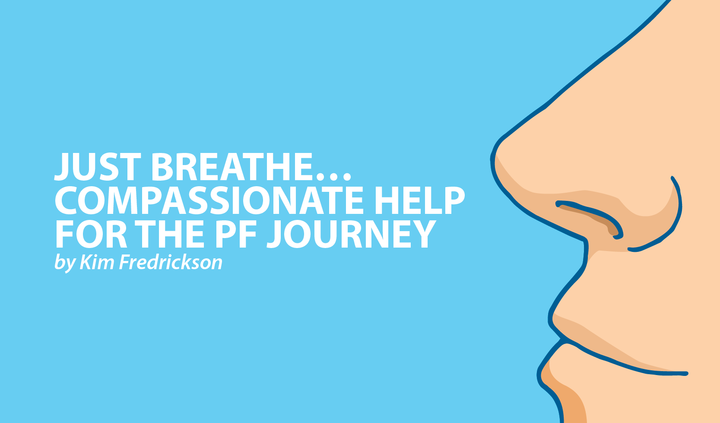Some Tips and Resources to Help Tackle Your Sleep Problems
Written by |


Pulmonary fibrosis patients, like myself, have to deal with lots of symptoms and hardships on a daily basis because of our disease. One of those difficulties for me is trouble sleeping.
Sleep problems come from a variety of sources
Among them:
- Medication side effects. Some of those medications are CellCept (mycophenolate mofetil), prednisone, and Esbriet (pirfenidone)).
- Coughing.
- Not enough oxygen. That’s because everyone’s breathing slows when we sleep.
- Aches and pains.
- Sleep apnea.
- Anxiety.
It’s hard to get enough oxygen during the day, but it can be even harder at night. I often long for bedtime to get a break from fatigue and the stress of dealing with oxygen.
Unfortunately, it is often hard to get to sleep and stay asleep. This is a big problem, because not getting enough sleep contributes to even more fatigue and lowered quality of life. And we deal with enough of those problems already.
PF patients are vulnerable to sleep problems
PF patients are particularly vulnerable during the rapid eye movement, or REM, part of the sleep cycle. REM sleep is the most rejuvenating part of the cycle, but poses a problem for PF patients. During REM sleep, the diaphragm does all the breathing, while the smaller accessory muscles are temporarily not functional.
Those without a lung disease have no problem when this happens, but it is problematic for PF patients. Our blood O2 levels may go down and cause us to wake up, disrupting our REM sleep. This is significant because it is during REM sleep that we dream, consolidate our memories, give our bodies a chance to recover, and get ready for the next day. Not getting enough sleep can also lower the functioning of our immune system.
I’ve been working hard to improve my sleep
Here are some things that have helped me. When I see this list, I can see I am quite high-maintenance.
Melatonin: I take CellCept, which makes it difficult to fall asleep. So I take melatonin, a natural supplement, 60 to 90 minutes before bed. That helps me fall asleep.
Foam bed wedge: I sleep with a foam bed wedge that elevates my upper body. The University of Maryland Medical Center suggests sleeping on your side, rather than your back, and using foam wedges to raise your upper body. It sure does help me.
Epsom salt bath: I take a bath about an hour before bed, which helps me relax. It also reduces the swelling in my legs, which is a side effect from taking CellCept. Epsom salt, absorbed through the skin, is also a natural anti-inflammatory agent.
Cool mist humidifier: I sleep with a humidifier near my head. It helps soothe my dry nose and helps me sleep better. Warm mist humidifiers make it harder for me to breathe.
10-3-2-1-0 System: Craig Ballantyne, in the Early to Rise blog, has sleep tips called the 10-3-2-1-0 system that might help, too:
• 10 hours before bed – No more caffeine.
• 3 hours before bed – No more food or alcohol.
• 2 hours before bed – No more work.
• 1 hour before bed – No more screen time. Turn off all phones, TVs and computers.
• 0 – The number of times you will hit the snooze button in the morning.
I must say, I am sleeping better and feeling better since adopting these solutions. All of us are different, so what works for me may not work for you. Please talk with your doctor about any sleep problems you are having, and any solutions you are considering.
I would love to hear about any sleep problems you are having, as well as any solutions that have helped you.
We’re in this together, and we can benefit from our combined courage, ingenuity and support. Please share this post with anyone you think could benefit, or on social media.
You might also want to check out these reports on studies of PF and sleep disorders and monitoring sleep before fatigue sets in.
***
Note: Pulmonary Fibrosis News is strictly a news and information website about the disease. It does not provide medical advice, diagnosis, or treatment. This content is not intended to be a substitute for professional medical advice, diagnosis, or treatment. Always seek the advice of your physician or other qualified health provider with any questions you may have regarding a medical condition. Never disregard professional medical advice or delay in seeking it because of something you have read on this website. The opinions expressed in this column are not those of Pulmonary Fibrosis News, or its parent company, Bionews Services, and are intended to spark discussion about issues pertaining to pulmonary fibrosis.






Sandy
I, too, have not been sleeping well (prednisone) and my eyes show it. I just recently asked my GP if I could take a sleeping pill. He prescribed 5 MG Zolpidem (Ambien) and what a difference this has made for me. (Melatonin did not work for me). I follow a similar 10-3-2-1 procedure every evening. This may not be for everyone, but it has made a huge difference for me.
Kim Fredrickson
Hi Sandy, thanks so much for sharing your wisdom with us. Really glad to hear the ambien is helping you. What a difference sleep makes. Take Good Care...
Dana Callahan
Thank you Kim for sharing these sleeping tips. I too am on Esbriet and have had trouble going to sleep at night. I have been taking 1/2 of a Tylenol PM about 3 hours before I want to go to sleep and it has helped me. Sometimes, I just have to set up and read a book till I get sleepy. Many days I am so tried I have to take an afternoon nap, and I think that makes it even more difficult to fall asleep at night. But, I do believe that the Esbriet is helping me very much, and I am so grateful to GOD for that. Thank you for sharing with us. I have learned so much from your posts. Best Regards, Dana
Kim Fredrickson
Hi Dana...so sorry you have trouble getting to sleep too. At least it is for a good reason...so glad the Esbriet is helping! Yes...thanks to God. It's always nice to hear from you :)
Michael
When first dx with Ipf in June 2013 was told I had mild sleep apnoea and started to use a CPAP machine which has cured the sleep apnoea and given me good quality sleep,
Michael
Kim Fredrickson
Michael, So glad the CPAP has helped so much!!!
Patricia Fordham
I just received my first diagnosis yesterday, my brother died from this disease 2.5 months ago. I am looking for information to help with this disease.
Kim Fredrickson
Hi Patricia! So sorry for your recent diagnosis and your brothers death. So very sorry about both. I too found getting good info about this disease difficult over the 5 years I’ve had it. I recently released a book that I hope will help you on your journey. “Pulmonary Fibrosis Journey: A Counselor and Fellow Patient Walks with You.” It is available on Amazon.com in both paperback and Kindle. I would also get a referral to a local well respected pulmonologist in your area and ask him/her to refer you to a “ Center of Excellence.” Many more details and links in book! Sending you a gentle hug at such a difficult time. ❤️
Emz Hughes
How are you doing? My dad has just been diagnosed with this and I have been doing research and there seems to be a new gene therapy that could potentially be a cure for IPF.
LINDA MORIN
I am sorry to report that she passed away yesterday.. RIP...Her Lung did not come in time.. what a warrior.
Carolyn Price
I have had PF since 2017. I currently take OFED, with some side effects. I am on oxygen 24/7. This has happened since I had Covid. My pulmonary doctor is a general practice doctor, not a specialist, and I live in a small town (pop. 850). I do not have access to a specialist, and now that I seem to be getting worse I have no one to turn to. I really hope someone can give ne some advise. Thanks